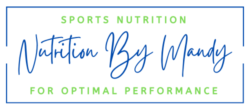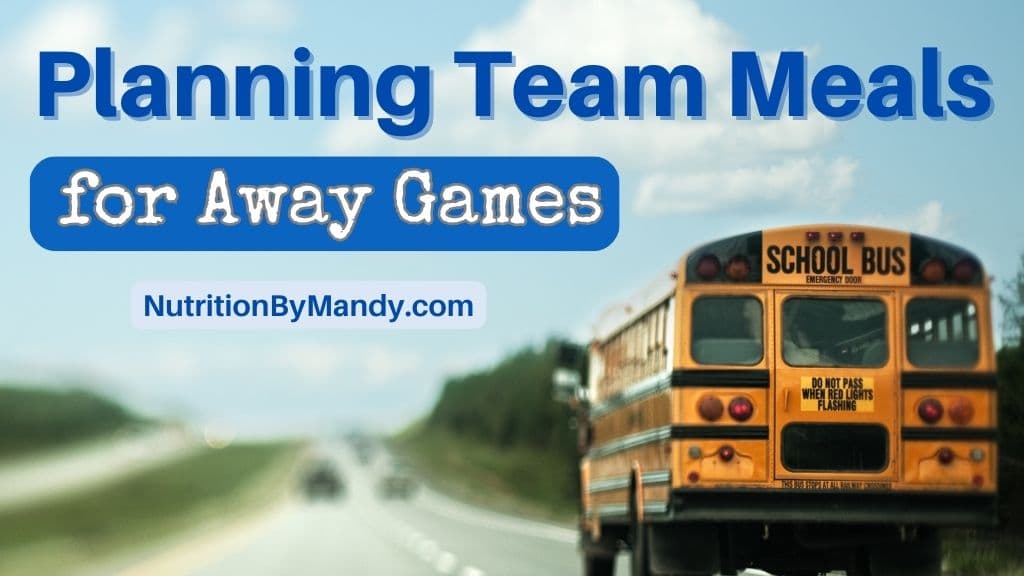Planning Team Meals for Away Games
When teams travel for competition, it can be a challenge to plan meals that meet the sports nutrition needs of the athletes. Thus, it is helpful to have ideas for team meals athletes can enjoy before and after away games.
Let’s take a look at key considerations when planning team meals. Then we will explore ideas for pre- and post-game meals for away competitions.
Key Considerations When Planning Team Meals for Away Games
There are several factors to take into consideration when planning team meals for away games, including: food allergies, food budget, how and where the meals will be served, and food safety.
Athletes with Food Allergies or Special Diets
Prior to planning meals for a team, it is important to find out if any athletes have food allergies. If unsure, avoid serving foods that contain major allergens. Also make sure all food items at meals are clearly labeled and identify potential food allergens.
In addition to food allergies, find out if any athletes are following a special diet that needs to be planned for. This may include athletes following a vegetarian or vegan diet or athletes who follow a gluten-free meal plan.

Food Budget
Knowing how much money you can spend on the team meal is an important consideration. Rest assured that even if you do not have a large food budget, there are still ways to provide a quality pre- and post-game meal. With careful planning you can provide a budget-friendly meal that athletes will enjoy and that will meet their nutrition needs.
Meal Set-Up and Service
It is important to have a plan for how and where the meals will be served to the team. Will the meal be set-up as a buffet or will boxed meals be provided? If the meal is set-up as a buffet, make sure to plan for serving utensils, plates, napkins, and utensils.
If ordering boxed meals, consider allowing the athletes a limited variety to select from (i.e., type of sandwich). Providing athletes with choice can help increase acceptance of the meal and also decrease food waste.
If you are having the meal delivered to a gymnasium or hotel for the team, make sure the facility will allow outside food to be brought in. Also ensure you will have adequate space at the facility to set the meal up for service.
Importance of Food Safety for Team Meals
When planning team meals for away games it is important to keep food safety in mind. Holding foods at the correct temperature is a critical aspect of food safety.
The Centers for Disease Control and Prevention defines the temperature range between 40°F and 140°F, as the “Danger Zone” in which bacteria can rapidly grow. Perishable foods should not be left sitting in the temperature danger zone for more than 2 hours. This time frame decreases to 1 hour if the temperature exceeds 90 °F, such as at an outdoor summer game.
When setting up the delivery time for pre- and post-game meals keep these time limits in mind. This is especially important if you do not have the ability to hold food hot and/or cold.
Food left in the temperature danger zone over the recommended time frames should be thrown away. You do not want to risk athletes on the team getting a foodborne illness.
Hand Washing Before Eating
In addition to food temperature control, having athletes wash their hands prior to eating is another critical aspect of food safety.
If athletes will not have access to soap and water to wash their hands at the game or on the bus, the Centers for Disease Control and Prevention recommends using an alcohol-based hand sanitizer. The hand sanitizer should contain at least 60% alcohol.
Consider placing a container of hand sanitizer in the food service area and also have it available on the bus. Encourage athletes to use the hand sanitizer prior to eating their meals.

Planning Pre- and Post-Game Team Meals
Let’s now take a look at ideas for planning pre- and post-game team meals that will help athletes meet their sports nutrition needs. Taking time to carefully plan meals can help ensure athletes are fueled for game day.
Pre-Game Team Meals for Away Games
When possible, schedule pre-game team meals to be eaten 3-4 hours prior to the start of the competition. This allows time for athletes to digest their meals and go to the restroom before the game if needed.
Pre-Game Meal Menu
Carbohydrates should be at the foundation of the team’s pre-game meal, as they provide athletes with the energy needed to perform at their best. Consider the following ideas for adding carbohydrates to the pre-game meal.
- Fresh fruit, dried fruit, 100% fruit juice, fruit smoothies
- Grains: Bread, bagels, pasta, rice, quinoa, oatmeal, cereal
- Starchy Vegetables: Potatoes, sweet potatoes, corn, green peas
- Milk and yogurt
In addition to carbohydrates, the pre-game meal should contain a moderate amount of lean protein and be low in saturated fat and fiber.
Example Pre-Game Team Meals:
- Breakfast buffet: Pancakes, scrambled eggs, oatmeal, bagels, nut butter, fresh sliced fruit
- Breakfast to-go: Ham and egg breakfast sandwich on a bagel or English muffin, fruit and yogurt parfait, fresh sliced fruit cup
- Pasta with grilled chicken, bread sticks, fresh sliced fruit
- Sub sandwiches (turkey, chicken, ham, roast beef), pretzels, grapes
- Grilled salmon or chicken, rice, corn, sliced melon, dinner rolls
Foods to Limit Prior to Competition
With the pre-game meal it is best to limit foods that are high in saturated fat, fiber, and/or protein. Consuming these foods too close to the start of activity may cause some athletes to experience GI distress during the competition (1).
This includes foods such as:
- Fried or greasy foods
- Heavy cream, cheese, or buttery sauces
- Dessert foods (ice cream, brownies, fudge)
- Beans and legumes
- High-fiber vegetables (cauliflower, broccoli, Brussel sprouts, cabbage)
- Whole grains (high-fiber)

Hydration with the Pre-Event Meal
Encouraging athletes to drink fluid with the pre-game meal will help ensure they go into the game optimally hydrated. Consider offering a variety of beverages with the pre-game meal, including: water, 100% juice, low-fat milk, and sports drinks.
It is recommended to drink 5-7 mL/kg of body weight of fluid approximately 4 hours prior to the event (2). For a 175-pound athlete, this would be ~13 – 19 fluid ounces. For most athletes, consuming approximately 2 cups of fluid with the pre-event meal can assist them with meeting this goal.
Post-Game Meals for Away Games
When planning the post-game meal aim to provide food and beverages that can help meet the recovery nutrition needs of athletes.
The goal of recovery nutrition is for athletes to replace the fuel and fluid used during the activity. The three key areas athletes should focus on when it comes to recovery nutrition include:
- Fluid and Electrolytes: Rehydrate to replace fluid and electrolytes lost in sweat
- Carbohydrates: Refill energy stores (glycogen stores) used during the activity
- Protein: Build and repair muscles
Easy Post-Game Team Meal Ideas for the Bus
Following a competition, many athletic teams are anxious to get on the bus and head home. Therefore, having easy meal ideas for the bus can be of help. Consider having the meals for the bus individually bagged or boxed to help with distributing to the athletes.
Here are several easy options:
- Sub sandwich (turkey, ham, chicken, or roast beef), baked chips, fresh fruit cup
- Chicken or steak burrito with rice and beans (salsa and guacamole on the side)
- Grilled chicken wrap or sandwich, pretzels, fruit and yogurt parfait
- Asian bowl: Teriyaki chicken or beef and broccoli, steamed brown rice, spring roll
Don’t forget to plan beverages for the athletes to enjoy with the meal on the bus as well. Providing drink options such as bottled water, sports drinks, 100% fruit juice, or low-fat milk are all good choices.

Post-Game Meal Menu Ideas
If catering a team post-game meal that will be delivered to the gym, try putting together a menu that allows the athletes to have a choice. Example post-game menus may include:
- Build Your Own Burrito: Chicken or beef fajita, cilantro lime brown rice, black beans, salsa, lettuce, tomato, guacamole, tortillas
- Pasta: Pasta noodles, marinara sauce, pesto sauce, grilled chicken, turkey meatballs, grilled vegetables, breadsticks, Caesar salad
- Asian Food: Beef and broccoli, teriyaki chicken, brown rice, steamed vegetables, spring rolls
- BBQ: Smoked turkey breast, roasted potato wedges, green beans, bread
- Grilled chicken or salmon, rice pilaf, steamed broccoli, dinner rolls, fresh fruit
Team Meals for Away Games – Restaurant Catering
There are numerous restaurants that can accommodate the pre- and post-game meals suggested above. To help get you going in the right direction, here are a few restaurants to consider:
- Chipotle – Burritos, burrito bowls
- Jason’s Deli – Pasta, potatoes, sandwiches, breakfast trays
- Panera – Breakfast, sandwiches, bowls
- Chick-fil-A – Grilled chicken sandwiches and wraps, fresh fruit cups, fruit and yogurt parfaits
- Maggiano’s Little Italy or Olive Garden – Pasta
- Pei Wei – Asian food buffet or boxed lunches
Planning Team Meals for Away Games
You are now set with a variety of ideas for planning team meals for away games. Remember to keep food allergies, budget, service style, and food safety in mind when planning the team’s meals. Taking time to plan ahead can help ensure the athletes on the team are fueled for success.
For additional sports nutrition tips, check out my blog: Easy Grab-and-Go Lunch Ideas for Athletes.
Join the Nutrition By Mandy Email List & Get a Free Athlete’s Grocery List
Click HERE to join the Nutrition By Mandy e-mail list. When you join you will receive a free athlete’s grocery list to print and take with you to the store.
About the Author
Mandy is a Sports Dietitian Nutritionist in the San Antonio, TX area. She is a Registered and Licensed Dietitian, a Board-Certified Specialist in Sports Dietetics, a Licensed Athletic Trainer, and is a Certified Exercise Physiologist through the American College of Sports Medicine. Mandy has experience working with athletes at the high school, collegiate, and professional levels. She believes the key to reaching one’s full potential, both in everyday life and in sports performance, relies on a healthy nutritional foundation. Learn more about the work Mandy does here.

